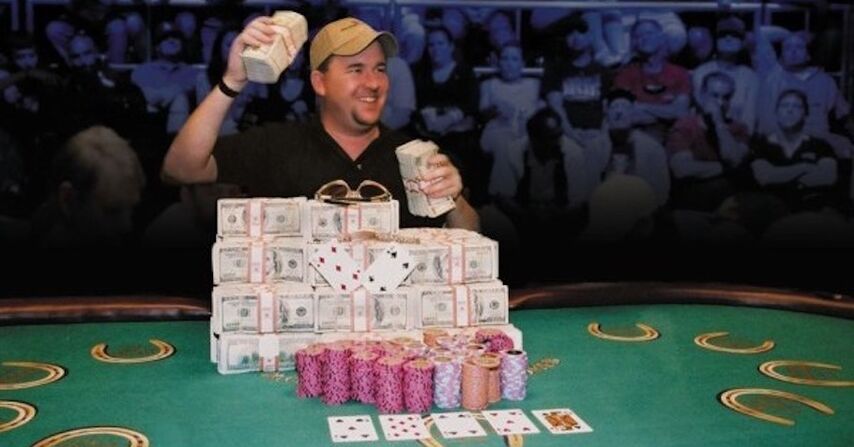If you are an avid sports fan, or even follow sports somewhat casually, you’ve probably heard the phrase, “Everyone loves a good underdog story.” An underdog, in this case, meaning a team or a player who defied the odds, and pulled off a massive upset of some kind, inspiring thousands of kids and fans in the process. Think of the USA Hockey Team upsetting the USSR in the 1980 Olympics, or the classic football movie “Rudy”, if movies are more your thing. Just like in sports, underdogs have often thrived at the poker tables, because in poker, anyone can beat anyone on any given day. Let’s dive a bit deeper.
What is Underdog in Poker?
As you can tell by now, an underdog for poker specifically would be an unlikely amateur who sits down with the likes of Phil Ivey, Daniel Negreanu, Alex Foxen, and Chance Kornuth, just to name a few of poker's biggest sharks at the moment. It is clear in these kinds of cases, that the amateur will lose their stack far more often than they will take stacks from these established pros. Can it happen? Of course, otherwise, underdog stories would never exist to begin with. But poker is a game of math, and the math says in this case that the underdog is in big trouble. However, the underdog can still break all the rules and still can come out on top. With that said, you don’t need an incredible cinderella run to be an underdog in poker. In fact, you see them all the time in poker.
Other Underdogs in Everyday Poker
If you go to any poker room around the world today, you will see underdogs in a smaller capacity at every single table. A player who folds down to just a couple of big blinds to squeeze into the money will sometimes spin that short stack up and get back into contention going to the final table. Such a run would often qualify them for a good underdog story, another case of rags to riches on a smaller scale that is often seen in poker, whether live or online on sites like GGPoker.
You could also argue that there are underdogs in every all-in confrontation, as usually one player will be behind and need to catch a lucky card to double up. If a player gets it in with pocket sevens, and they run into an opponent with pocket jacks, they are a severe underdog, usually only 20% to win. Occasionally they will suck out and win, but more often than not, the underdog in this case will lose.
You wouldn’t consider an aggressive big stack who gets it in bad on a bold move to be an underdog, but a short stack that patiently waited only to run into a monster hand certainly would qualify if they are able to catch that lucky card to cling onto survival.
Poker’s Biggest Ever Underdog Stories
Poker has seen its fair share of incredible tournament results from the biggest names in poker, but it doesn’t always work out like that. Sometimes, a player comes out of nowhere, stares down the best players in the world, and quite simply, defies all the odds.
The top underdog on our list is likely obvious to those who have followed poker for a while. It’s the man who started the poker boom in 2003, Chris Moneymaker. The amateur accountant at the time was playing his first ever live poker tournament and had qualified for the Main Event through a $39 satellite on Pokerstars, meaning he turned that paltry fee into $2,500,000.
On route to his historic win over the field of 839, a record at the time, Moneymaker busted the likes of two-time WSOP champion and Hall of Famer Johnny Chan, poker personality Humberto Brenes, and on the final table bubble, he scored a historic knockout of the aforementioned Phil Ivey, when he made a bigger full house than Ivey on the river.

Moneymaker would go on to defeat another established pro Sam Farha heads up, pulling off arguably the most famous bluff of all time in the process. Moneymaker’s historic underdog run fueled many other similar Cinderella stories.
Jerry Yang also comes to mind in 2007. The amateur at the time started the Main Event final table as one of the short stacks, but dominated the start-of-day chip leader Philip Hilm in multiple pots, often time with his famous bets of “1 million” at a time. Yang propelled himself to the chip lead, and ultimately won the Main Event for $8,250,000.
The WSOP isn’t the only place where underdogs have thrived in poker. Pokerstars tried to capitalize on the general public’s love of underdogs with “The Big Game” TV show. There, one amateur would be staked into a high-stakes cash game with some of poker biggest stars. If they lost any money, Pokerstars would eat the cost. If the amateur won money, they kept all the profits, a pure freeroll for the amateur each week. Most amateurs walked home empty handed, but one underdog, Ernest Wiggins, won big, including one of the most iconic hands ever televised against “The Poker Brat” Phil Hellmuth.

Underdogs are everywhere you look in poker. It’s a game that can be played by anyone and can turn anyone into a star, whether it’s a kid from Maryland like Phil Ivey, or a troublemaker from Brooklyn like Stu Ungar who rose to stardom because of poker before the perils of Las Vegas and Atlantic City slowly drained him of life.
Work on your game, pay attention to your opponents, and maybe you will be the next incredible underdog story that inspires the next generation of poker players.


















